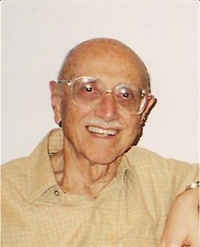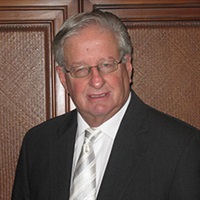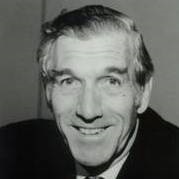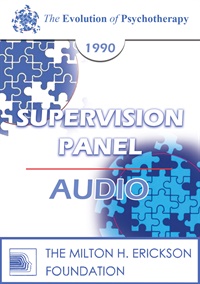EP90 Supervision Panel 04 - Judd Marmor, MD, PhD; Donald Meichenbaum, PhD; Paul Watzlawick, PhD
- Average Rating:
- Not yet rated
- Topic Areas:
- Supervision Panels | Supervision | Psychotherapy | Case Discussions | Systems Theory
- Categories:
- Evolution of Psychotherapy | Evolution of Psychotherapy 1990 | Pioneers in Couples and Family Therapy
- Faculty:
- Judd Marmor | Donald Meichenbaum, PhD | Paul Watzlawick, PhD
- Duration:
- 55 Minutes
- Format:
- Audio Only
- Original Program Date:
- Dec 15, 1990
- License:
- Never Expires.
Description
Description: This lively supervision panel offers contrasting clinical perspectives on real-world cases. Topics include the value of history-taking, present-focused interventions, and paradoxical techniques. Two cases—a 10-year-old girl with OCD and a 62-year-old man with anxiety—serve as springboards for a rich discussion on trauma, family systems, and the therapeutic alliance.
Moderated by Bill O'Hanlon, MS
Educational Objectives:
- To compare and contrast clinical and philosophical perspectives of experts.
*Sessions may be edited for content and to preserve confidentiality*
Credits
Handouts
| Timestamped Transcript (827.1 KB) | 19 Pages | Available after Purchase |
| Ericksonian Learning Snapshot (245 KB) | 2 Pages | Available after Purchase |
Faculty

Judd Marmor Related Seminars and Products
Judd Marmor, MD, was an American psychiatrist known for his role in removing homosexuality from the American Psychiatric Association Diagnostic and Statistical Manual of Mental Disorders. Judd was an adjunct Professor of Psychiatry at the University of California in LA, was Franz Alexander Professor of Psychiatry at the University of Southern California School of Medicine. he has practices medicine for more than 50 years, having graduated from Columbia University College of Physicians and Surgeons in 1933. He is past president of the American Psychiatric Association, American Academy of Psychoanalysis, and The Group for the Advancement of Psychoanalysis, and The Group for the Advancement of Psychiatry. He is recipient of the Bowis Award for Outstanding Achievements in Leadership in the Field of Psychiatry from the American College of Psychiatrists and the Founders Award from the American Psychiatric Association. Dr. Marmor served on the editorial board of 14 journals.He authored five books and co-authored one. He has written or co-written more than 300 scientific papers. Much of his writing has been on psychoanalysis and human sexuality.

Donald Meichenbaum, PhD Related Seminars and Products
Donald Meichenbaum, Ph.D in Clinical Psychology is currently Research Director of Melissa Institute for Violence Prevention, Miami (melissainstitute.org). He is one of the founders of cognitive behavior therapy. He was voted one of the most influential psychotherapists of the 20th century. Latest books include "Roadmap to Resilience" (www.roadmaptoresilience.com) and "Evolution of Cognitive Behavior Therapy: A Personal and Professional Journey."

Paul Watzlawick, PhD Related Seminars and Products
Paul Watzlawick, received his Ph.D. from the University of Venice in 1949. He has an Analyst's Diploma from the C.G. Jung Institute for Analytic Psychology in Zurich. Watzlawick has practiced psychotherapy for more than 30 years. He was research associate and principal investigator at the Mental Research Institute. He was Clinical Professor at the Department of Psychiatry and Behavioral Sciences, Stanford University Medical Center. Watzlawick is a noted family therapist; he is recipient of the Distinguished Achievement Award from the American Family Therapy Association. Also, he is author, co-author or editor of eight books on the topics of interactional psychotherapy, human communication and constructivist philosophy.
He formulated five axioms. They are:
- It is not possible to not communicate. Every behavior is some kind of non-verbal communication.
- Every communication has a content. In addition, there is 'metainformation', which says how the communicator wants to be understood.
- All partners involved in a communication process also interpret their own behaviour during communication.
- Human communication involves both verbal and non-verbal communication. In addition to the spoken words, there are is also a non-spoken part (gestures, behavior, intonation..) which is part of the communication.
- Communication between humans is either symmetric or complementary. This is based on whether the relationship of those communicating is based on differences or parity.


